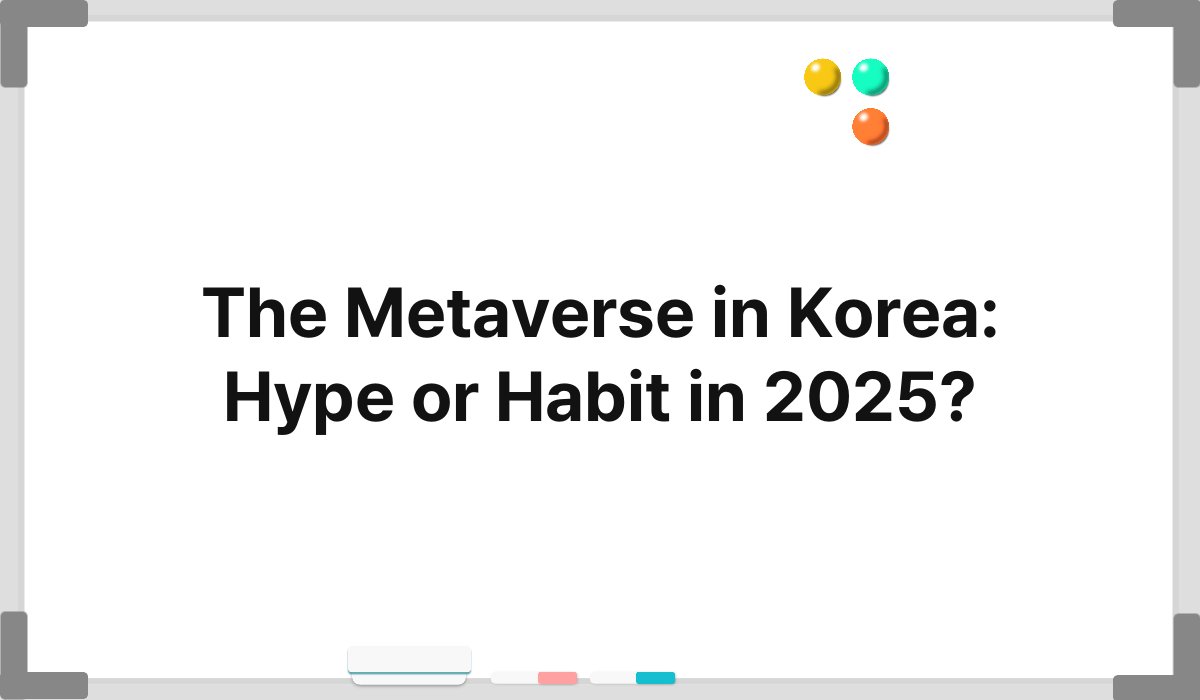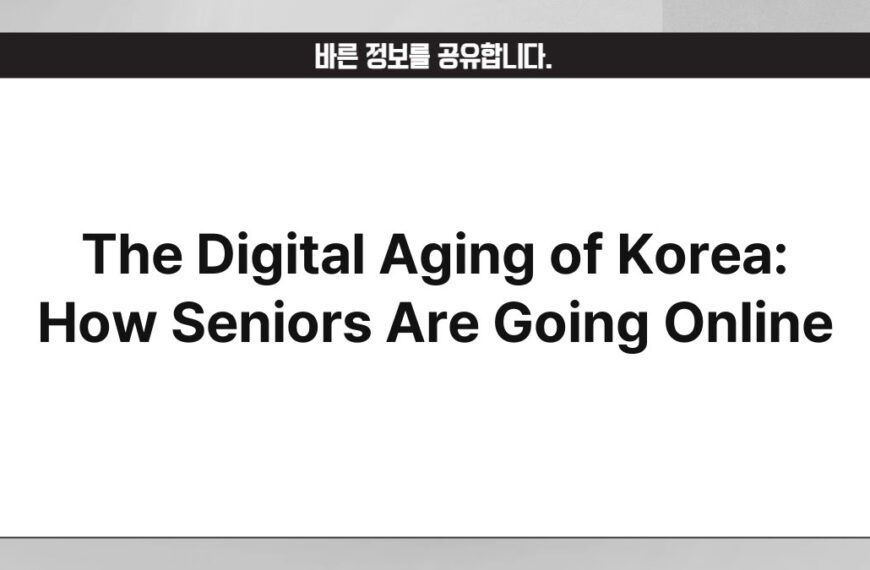[K-Bridge/Samuel] The Metaverse in Korea: Hype or Habit in 2025? represents a pivotal exploration into the evolving digital landscape of South Korea.
As technology continues to advance, the concept of the metaverse has gained significant traction, prompting discussions about its potential impact on society and daily life.
This discourse raises critical questions about whether the metaverse will become a fleeting trend or a foundational aspect of everyday existence by 2025. Through this article, readers will gain insights into the current state of the metaverse in Korea, its anticipated developments, and the societal implications that accompany this digital transformation.
The Current Landscape of The Metaverse in Korea
The Rise of Virtual Communities
In recent years, virtual communities have emerged as a significant aspect of the metaverse in Korea.
These communities offer users a platform to connect, collaborate, and share experiences in immersive environments.
The rise of platforms such as ZEPETO and Roblox illustrates how individuals, especially younger generations, are gravitating towards these digital spaces.
Users can create avatars, engage in social interactions, and partake in various activities, fostering a sense of belonging that transcends geographical boundaries.
Additionally, the integration of social media into these virtual environments has further enhanced user engagement.
Platforms are now incorporating features that allow for real-time communication and interaction, blurring the lines between virtual and physical socialization.
As a result, users can maintain relationships and build new connections, contributing to a vibrant online community.
This shift towards virtual communities signifies a cultural change in how people perceive social interaction, raising questions about the long-term sustainability of these relationships.
The popularity of these virtual communities also reflects a broader trend of digital escapism.
As individuals seek refuge from the challenges of reality, the metaverse provides an attractive alternative.
This phenomenon raises concerns about the potential for addiction and the impact on mental health, particularly among younger users.
As the metaverse continues to evolve, striking a balance between the benefits of virtual communities and the risks associated with excessive engagement will be crucial.
Economic Implications of The Metaverse
The economic potential of the metaverse in Korea cannot be overlooked.
As companies increasingly invest in virtual experiences, new business models are emerging.
Industries such as gaming, entertainment, and retail are capitalizing on the metaverse to create innovative products and services.
For instance, virtual real estate has become a hot commodity, with users purchasing digital land to create experiences or monetize their investments.
Moreover, the metaverse is driving the growth of the digital economy, with many businesses exploring ways to integrate virtual experiences into their marketing strategies.
Brands are leveraging augmented reality and virtual reality technologies to provide immersive shopping experiences, enhancing customer engagement and satisfaction.
This trend highlights the metaverse’s role in reshaping consumer behavior and expectations, as users increasingly seek interactive and personalized experiences.
The economic implications extend beyond traditional industries, as the metaverse creates opportunities for new job roles and skillsets.
As demand for virtual content creators, developers, and marketers grows, educational institutions are adapting their curricula to prepare students for careers in this emerging field.
This shift underscores the metaverse’s potential to influence the job market and the skills required for future employment.
Government and Policy Responses
As the metaverse gains prominence, the South Korean government is recognizing the need for regulatory frameworks to address the challenges and opportunities it presents.
Policymakers are exploring ways to foster innovation while ensuring user safety and privacy.
Initiatives aimed at promoting the development of the metaverse, such as funding for research and infrastructure, are being implemented to position Korea as a leader in this digital frontier.
However, the rapid pace of technological advancement poses challenges for regulation.
Striking a balance between fostering innovation and protecting users from potential risks, such as cyberbullying or data breaches, is a complex task.
Policymakers must engage in ongoing dialogue with industry stakeholders to develop effective regulations that promote responsible usage of the metaverse.
Furthermore, the government is also focusing on digital literacy initiatives to equip citizens with the skills necessary to navigate the metaverse safely.
As users increasingly engage with virtual environments, understanding the implications of their online behavior becomes paramount.
By prioritizing education and awareness, the government aims to empower individuals to make informed decisions in the metaverse.
The Cultural Shift Towards The Metaverse
Changing Perceptions of Reality
The metaverse is reshaping cultural perceptions of reality and identity.
As users immerse themselves in virtual environments, they often adopt new personas and explore facets of their identity that may not be present in their physical lives.
This shift raises intriguing questions about authenticity and self-representation, as individuals navigate the complexities of their online personas.
In this context, the metaverse serves as a platform for self-expression and experimentation.
Users can curate their digital identities, choosing how they present themselves to others.
This newfound freedom allows for greater creativity and exploration, enabling individuals to connect with like-minded communities.
However, it also raises concerns about the potential for identity distortion and the impact on self-esteem, particularly for younger users who may struggle to reconcile their online and offline identities.
Moreover, the cultural significance of the metaverse extends beyond individual identity.
It is influencing art, music, and entertainment, as creators leverage virtual spaces to showcase their work.
The rise of virtual concerts and art exhibitions illustrates how the metaverse is becoming a new frontier for cultural expression.
This evolution invites discussions about the future of creativity and the role of technology in shaping artistic experiences.
The Role of Gaming in The Metaverse
Gaming has been a driving force behind the growth of the metaverse in Korea.
With a robust gaming culture, South Korea is home to numerous popular games that incorporate elements of the metaverse.
Titles such as “League of Legends” and “PlayerUnknown’s Battlegrounds” have not only garnered massive player bases but have also fostered communities that extend beyond gameplay.
The integration of social features within games allows players to connect, collaborate, and compete in immersive environments.
This sense of community enhances the gaming experience, as players forge friendships and engage in shared activities.
The success of gaming in the metaverse highlights its potential as a social platform, transcending traditional notions of entertainment.
Furthermore, the rise of esports has propelled gaming into the mainstream, with competitive tournaments attracting millions of viewers.
This phenomenon has created new opportunities for sponsorships, merchandise sales, and content creation, solidifying gaming’s role in the broader metaverse ecosystem.
As the gaming industry continues to evolve, its influence on the metaverse will likely shape the future of digital entertainment.
Education and Training in The Metaverse
The metaverse is poised to revolutionize education and training in Korea.
Virtual environments offer unique opportunities for immersive learning experiences, allowing students to engage with content in dynamic ways.
Educational institutions are beginning to experiment with virtual classrooms, where students can collaborate and interact in real-time, regardless of their physical location.
This shift towards virtual education presents several advantages.
Students can access resources and expertise from around the world, enriching their learning experiences.
Additionally, the metaverse allows for experiential learning, where students can participate in simulations and practical applications of their studies.
This hands-on approach enhances retention and understanding, preparing students for real-world challenges.
However, the transition to virtual education also raises questions about accessibility and equity.
Ensuring that all students have access to the necessary technology and internet connectivity is crucial for the success of virtual learning initiatives.
Policymakers and educators must work together to address these disparities, ensuring that the benefits of the metaverse are accessible to all learners.
The Future of The Metaverse in Korea
Predictions for 2025
As we look towards 2025, the metaverse in Korea is expected to evolve significantly.
With advancements in technology, including augmented reality and virtual reality, the user experience will become increasingly immersive and interactive.
This evolution will likely lead to greater adoption across various sectors, including entertainment, education, and business.
Furthermore, the integration of artificial intelligence into the metaverse will enhance personalization, allowing users to tailor their experiences to their preferences.
This shift will contribute to a more engaging and meaningful interaction within virtual environments.
As users become more accustomed to these experiences, the metaverse may transition from a novelty to a habitual aspect of daily life.
However, the future of the metaverse will also depend on how society addresses the challenges it presents.
Issues related to privacy, security, and mental health will require ongoing attention and proactive measures.
Striking a balance between innovation and responsibility will be essential for fostering a sustainable metaverse that benefits all users.
Social Implications of The Metaverse
The social implications of the metaverse are profound, as it has the potential to reshape how individuals interact and form relationships.
As users increasingly engage in virtual environments, traditional notions of community and connection may evolve.
The metaverse offers a unique space for individuals to connect with others who share similar interests, fostering a sense of belonging that transcends geographical barriers.
However, this shift also raises concerns about the quality of relationships formed in the metaverse.
While virtual connections can provide companionship, they may lack the depth and authenticity of face-to-face interactions.
As individuals navigate their online and offline lives, finding a balance between virtual engagement and real-world relationships will be crucial for maintaining social well-being.
Moreover, the metaverse’s influence on social norms and behaviors cannot be overlooked.
As users engage in virtual environments, they may adopt new perspectives and attitudes that impact their interactions in the physical world.
This cultural exchange has the potential to foster greater empathy and understanding, but it also presents challenges related to online behavior and accountability.
The Role of Innovation in Shaping The Metaverse
Innovation will play a pivotal role in shaping the metaverse in Korea.
As technology continues to advance, new possibilities for interaction and engagement will emerge.
Companies and developers will need to stay ahead of the curve, continuously exploring ways to enhance user experiences and create compelling content.
Furthermore, collaboration between various stakeholders, including businesses, educators, and policymakers, will be essential for fostering a thriving metaverse ecosystem.
By working together, these entities can address challenges, share best practices, and promote responsible usage of virtual environments.
This collaborative approach will contribute to the metaverse’s evolution as a space that prioritizes user safety and well-being.
As the metaverse continues to develop, it will be crucial to remain vigilant about the ethical implications of technology.
Ensuring that innovation aligns with societal values and promotes inclusivity will be essential for building a metaverse that benefits all users.
The future of the metaverse in Korea will depend on a collective commitment to responsible innovation and a shared vision for a digital landscape that enhances the human experience.
In conclusion, The Metaverse in Korea: Hype or Habit in 2025? encapsulates a critical examination of the evolving digital landscape.
As virtual communities, economic implications, cultural shifts, and technological advancements converge, the metaverse is poised to become an integral part of everyday life.
Understanding these dynamics will be essential for navigating the opportunities and challenges that lie ahead as society embraces this new frontier.








